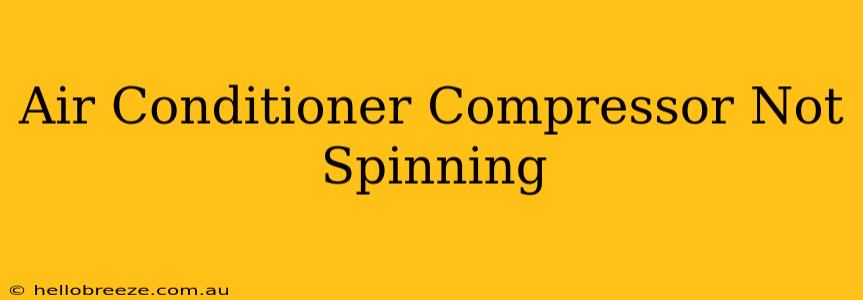Is your AC blowing warm air? A common culprit is a compressor that refuses to spin. This comprehensive guide will walk you through troubleshooting this frustrating problem, helping you pinpoint the cause and potentially saving you a costly service call. We'll cover everything from simple checks to more advanced diagnostics.
Understanding Your AC Compressor
Before diving into troubleshooting, let's briefly understand the compressor's role. The compressor is the heart of your air conditioning system. It's responsible for circulating refrigerant, the substance that absorbs heat from your home and releases it outside. Without a spinning compressor, your AC is essentially useless.
Common Reasons Why Your AC Compressor Isn't Spinning
Several issues can prevent your AC compressor from spinning. Let's explore some of the most frequent causes:
1. Power Supply Problems: The Most Obvious Culprit
- Check the Circuit Breaker: The most straightforward check is to ensure the circuit breaker controlling your AC unit hasn't tripped. Locate your breaker box and check for a tripped breaker—it will usually be in the "off" position. Simply switch it back "on".
- Examine the Wiring: Inspect the wiring leading to your outdoor unit and the connections at the compressor. Look for any loose connections, frayed wires, or signs of damage. Caution: If you're uncomfortable working with electricity, call a qualified HVAC technician.
- Check the Power Source: Make sure the power is actually getting to the unit. Is there a power outage affecting your home?
2. Problems with the Capacitor: The Silent Killer
The start capacitor is a critical component that helps the compressor start spinning. A faulty capacitor can prevent the compressor from initiating. This often manifests as a humming sound from the unit without the compressor actually spinning. Replacing a capacitor requires some electrical knowledge and safety precautions. If unsure, call for professional help.
3. Refrigerant Leaks: A Gradual Breakdown
Low refrigerant levels can cause the compressor to fail to start as a safety mechanism. A refrigerant leak is a more serious issue and requires professional detection and repair using specialized equipment. Never attempt to add refrigerant yourself.
4. Overheating: A Sign of Stress
If the compressor has overheated, a safety mechanism might be preventing it from restarting to avoid damage. Allow the unit sufficient time to cool down before attempting to restart it. Check for any obstructions blocking airflow around the outdoor unit.
5. Compressor Failure: The Worst-Case Scenario
Unfortunately, the compressor itself may have failed. This is often the most expensive repair, potentially necessitating compressor replacement. Signs of compressor failure might include unusual noises (knocking, grinding), burning smells, or complete lack of any response from the unit.
When to Call a Professional
While some troubleshooting steps can be attempted at home, certain situations necessitate calling an HVAC professional:
- You're uncomfortable working with electricity.
- You suspect a refrigerant leak.
- The compressor shows signs of physical damage.
- You've tried basic troubleshooting and the problem persists.
Ignoring a non-spinning compressor can lead to further damage and increased repair costs. Early diagnosis and professional intervention are crucial to maintaining your AC system's efficiency and longevity.
Preventing Future Problems
Regular AC maintenance is key to preventing compressor issues. Schedule annual maintenance checks by a qualified technician to identify and address potential problems early on. This proactive approach will help extend the life of your air conditioning system and save you money in the long run.
Remember, safety should always be your top priority. If you're unsure about any step in the troubleshooting process, it's always best to consult a qualified HVAC technician. Don't risk further damage to your equipment or personal injury.

